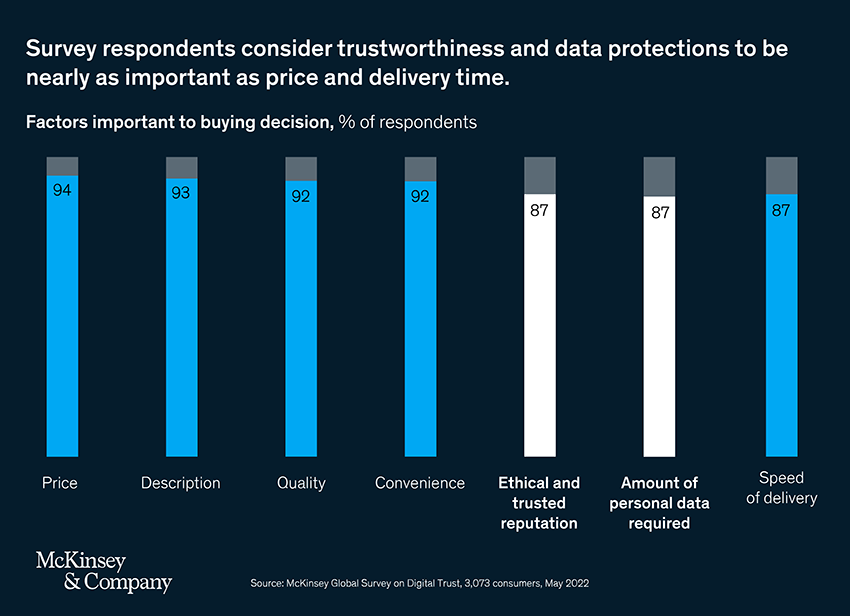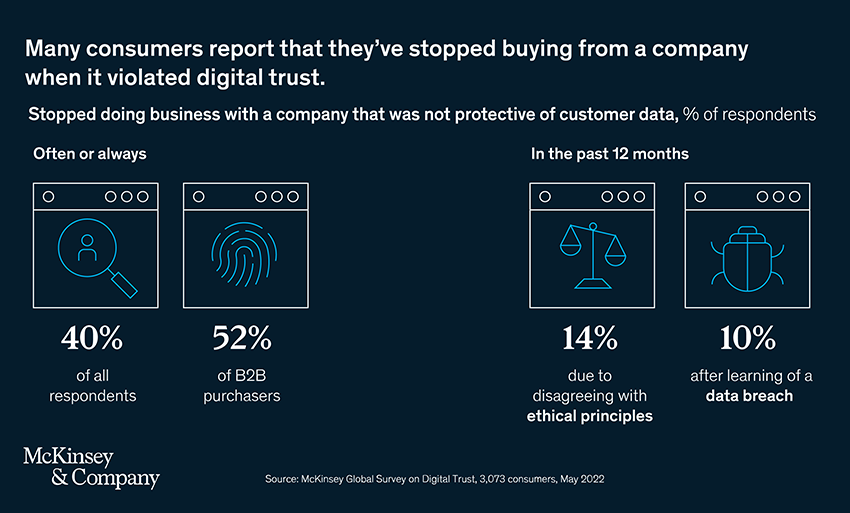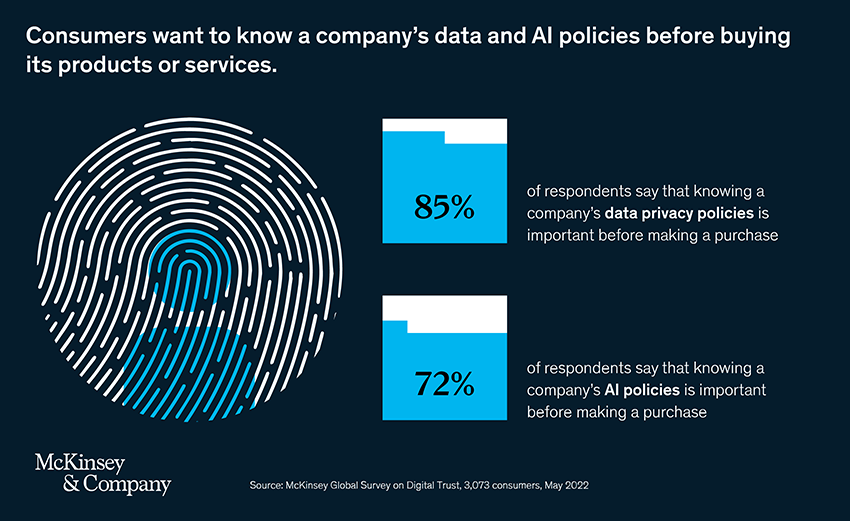
In the Internet's early days, digital trust revolved around the interactions and transactions between users and websites. These exchanges were fortified by a technology known as a public key infrastructure (PKI), granting them the pillars of authentication, encryption, and integrity. However, as the digital transformation accelerates and broadens its reach, PKI's use cases have expanded, and trust has matured into the bedrock of security in this interconnected world. This is the first of two articles exploring the meaning and benefits of digital trust.
Digital Trust in a Connected World
In today's fast-paced digital landscape, digital trust has evolved into a precious asset for businesses and organizations. It serves as the basis of informed decision-making, customer-centric innovations, and the engine that drives progress. However, as the digital sphere becomes increasingly saturated with information, a growing unease surrounds digital trust, particularly in terms of privacy and security. The need for establishing and nurturing digital trust has never been more pressing. This trust is the foundation that allows individuals and organizations to confidently engage in online interactions, transactions, and digital operations without compromising the holy values of privacy and security.
The leaders in digital trust are 14% more likely to establish strong relationships with their customers *
* McKinsey Report
Digital trust is no longer confined to securing online transactions; it now forms the basis for safeguarding users, software, servers, devices, digital content, documents, digital rights, identities, and a myriad of other digital facets. In essence, it is the guardian of our confidence in a world where the digital and the real converge in an intricate dance of trust and security.
What is Digital Trust?
Digital trust, also known as online trust or cyber trust, is the cornerstone of confidence and reliability in the digital realm. It underpins the faith that individuals, organizations, and systems place in the security, integrity, and authenticity of digital interactions, transactions, and experiences within the digital world. This concept is of paramount importance in the domains of cybersecurity and online business, where users and entities need to have a firm belief in the safety, privacy, and dependability of their digital interactions and the overarching digital environment.

Source: McKinsey Global Survey
Digital trust is similar to the implicit trust we place when engaging in online transactions or interactions. Imagine signing up for a software trial on a provider's website, where you entrust sensitive information like credit card details and personal data. This trust relies on the assurance that the custodian of your data will handle it by the stipulated terms and conditions, respecting your privacy and security. In essence, digital trust empowers organizations and individuals to navigate the digital landscape with the confidence that their digital footprints remain secure, and their interactions are protected.
The Benefits of Digital Trust
Digital trust is not just a legal requirement; it's a potent growth driver in today's fast-paced digital landscape. Companies that prioritize and invest in establishing digital trust tend to outperform their peers. When best practices in cybersecurity, data protection, and the delivery of trustworthy AI are integrated, the potential for growth significantly increases. Here are the key benefits of cultivating digital trust:
1. Customer Satisfaction
Digital trust enhances customer satisfaction. When customers know their data is safe, they enjoy doing business anytime, anywhere, leading to more sales.
2. Efficiency Boost
Building digital trust helps businesses understand their customers better, making operations smoother and more efficient. Moreover, it nurtures relationships with customers, leading to increased loyalty.
3. Enhanced Security
Digital trust encourages companies to protect customer data, reducing the likelihood of security breaches.
4. Increased Profits
Digital trust can boost profits by building customer trust and increasing conversions. Offering affordable services and products attracts a broader audience, resulting in long-term profit growth.

Source: McKinsey Global Survey
5. Good Reputation
Digital trust enhances brand reputation by promoting trust and engagement with customers, particularly through social media. It fosters transparency, consumer empowerment, and online activism, creating a positive impact.
6. Loyal Customers
Trust in data security and protection increases customer loyalty and keeps customers coming back. Strong cybersecurity measures and a consistent record of data protection standards build lasting relationships, as customers feel confident that their personal information is secure.
7. Better Teamwork
Digital trust facilitates the integration of financial data, enabling seamless collaboration between the different businesses. This, in turn, enhances the potential for valuable collaborations.
8. Smoother Processes
Digital trust streamlines processes, such as key management and compliance. This reduces the time and effort required to manage these processes while ensuring accuracy and compliance.
“… Building digital trust requires a cultural commitment to deliver an authentic digital experience that walks-the-talk and promotes brand loyalty.”
Josh Hamit - Senior vice president & chief information officer - Altra Federal Credit Union
9. Adaptability and Growth
Digital trust assures security and reliability, enabling users to engage in online transactions without fear of cyber risks. It also encourages innovation and helps companies stay ahead of the competition.
10. Safe and Secure Data
Digital trust promotes up-to-date cybersecurity and encryption practices. Customers are more aware of cyber risks and choose to engage with businesses they trust to protect their data, ensuring data security and privacy.
In a world where digital interactions and transactions play a central role, building and maintaining digital trust is a critical factor in ensuring the success, growth, and reputation of businesses and organizations.

Source: McKinsey Global Survey
The Importance of Digital Trust
In an ever-evolving digital landscape, the importance of digital trust cannot be overstated. From the user's perspective, trust in digital environments varies from one place to another, influenced by investments and regulations. However, for tech companies, this landscape is far from static. As users' expectations and interests shift rapidly, so too do the demands for trust guarantees. The digital economy's future hinges on businesses' ability to adapt and innovate, responding to the changing tides of public sentiment and regulatory pressures. It goes beyond cybersecurity; it's about building lasting relationships with customers and employees, securing your digital assets, and creating a resilient brand in an uncertain world.
Digital trust will continue to shape the competitive landscape, making it imperative for businesses to prioritize measures that establish and maintain trust in the digital era, ensuring their place in the ever-competitive business landscape of the future.
Keep an eye out for our next article, where we will explore the strategies on how to earn digital trust.